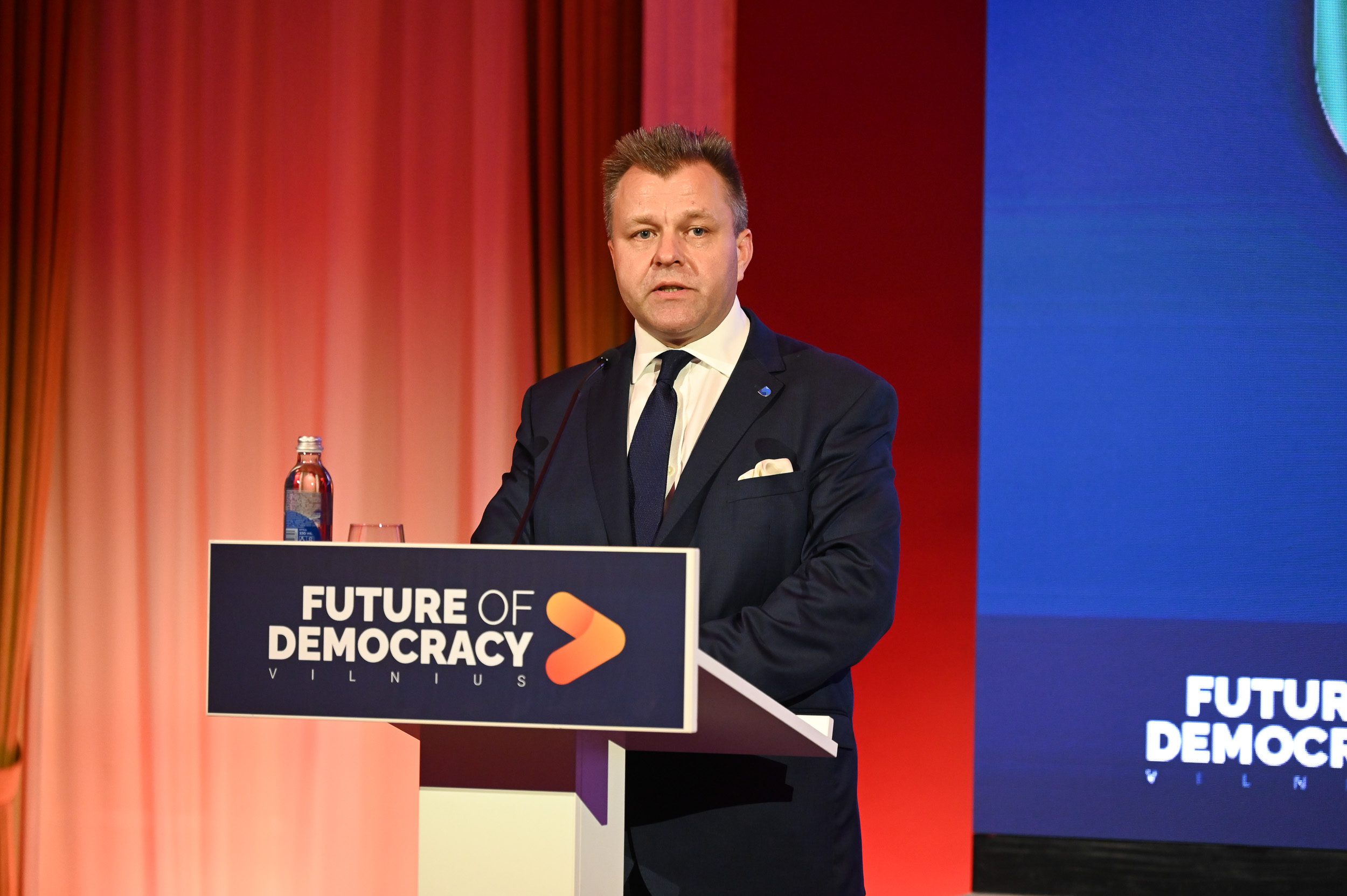

Secretary General dr. Mantas Adomėnas
Opening Address
At the 4th Forum for the Future of Democracy
Vilnius, 8th November, 2024
When we convened the first Forum 3 years ago, there was still no large-scale war in Ukraine. Can you imagine? We live in a different world now.
There were the first rumblings, first intelligence reports, which we followed with growing concern and unease, but it was impossible to imagine that the world was about to change in an irrevocable way so soon.
I have been reading Robert Harris’ most recent book, Precipice, just now, and there it paints a very similar picture: on the eve of World War 1, British Prime Minister Herbert Henry Asquith is preoccupied with all sorts of things – political turbulence and maintaining peace in Ireland, relations with a young mistress, Venetia Stanley, perturbations of Liberal politics… No one realises the stakes. When WW1 started, it was hard to guess it was going to be the war that will change the face of global reality.
There were people who thought this was just another of Russia’s little conflicts: there was Georgia, there was Syria, there was Ukraine 2014 edition…
Now it’s no longer just North Korean artillery, Iranian drones, Chinese electronics, Belarusian airfields. North Korea participates in the war in Ukraine.
In the war against democracy.
What unites those regimes is seeking to subvert, to challenge the world order.
It’s not an ordinary war. Some conflicts may even claim more victims, and yet may not be so defining in terms of global world order.
This is a new type of war, where weapons systems act in unison with disinformation, sabotage, transnational repression, cognitive and hybrid warfare attacks against Ukraine itself and supporters of Ukraine globally, war of unprecedented scale and sophistication.
It’s the war that is fully cognizant of democracies’ weaknesses and seeks to exploit them against themselves – in order, finally, to undermine and subvert them. Freedom of speech is weaponised against democracy and the measured political discourse which enables sound and strategic political decisions to be made. Economic freedom is abused to circumvent the sanctions. Openness of our societies is exploited for the purposes of transnational repression. And the list goes on
The war over democracy is the defining conflict of the coming decades, if not for the rest of the century.
It’s the war about the source of justification of political order – is sheer power sufficient to justify itself, or does it have to submit to standards: democratically expressed support of the citizens, human rights and human dignity, free choice and exercise of political liberty, legitimacy and rule of law, norms of the rules-based international order?
On the one side we have what we broadly term autocracies to whom power is justification of itself, whether it’s exercised disguised in Russian revanchist mystical nationalist or Chinese totalitarian narrative, North Korean Marxist or Iranian theocratic narrative. Individual human beings count only as the means to the goal. Nations are only as viable as they manage to align themselves with the great powers. Human rights is a fiction. Democracy is manipulatable concept. There are other names for it – sovereign democracy, illiberal democracy, or even ‘development’, which is just another name for exercise of power.
On the other side we have our, always imperfect, sometimes deeply flawed, democratic systems.
Whether democracy will survive those challenges – there is no guarantee. I for once do not subscribe to optimistic fatalism that everything, somehow, in the end will be well.
It may not – it will not – unless we stand up and fight. In order to do that, we must first realise we are at war. War which will not end with my generation, but may well continue into next one or the one after that.
And to win that fight we need community, real alliance of democracies, real solidarity.
Our strength is in our diversity, in our complementarity, in our different histories and experiences.
Contrary to Tolstoy, whose famous opening line of Anna Karenina says that “Happy families are all alike; every unhappy family is unhappy in its own way”, the truth is that all unhappy regimes are similar, all democracies are different.
Their diversity is a very real resource of strength – it’s not just a nice turn of phrase. We should admit that autocracies possess far from inconsiderable strengths: their immense concentration of political will, unimpeded by diversity of opinions and institutional checks and balances, their powers of mobilization, unchecked by concern for the well-being of their citizens, their long-term strategic thinking, unhindered by electoral cycles. The only thing we can oppose to their strengths is the wealth of innovation, constant dynamism, and diversity of solutions which arise from our different histories and experiences – and which help us to face and overcome the challenges that time inevitably brings.
We conceived of this Forum for the Future of Democracy at the height of Chinese economic coercion against Lithuania. After the opening of the Taiwanese Representative Office in Lithuania and China’s reponse, unprecedented in its vehemence and ferocity, we were looking for allies, for solidarity, for amplification of our message. Those who are at the forefront can be terribly alone, as Ukrainians discovered to their pain and sorrow.
Now the Forum is a place where bonds of solidarity in the face of common enemy must be forged, strengthened, and reconfirmed.
We can win this global conflict, but only together.
And the time to act is now.



